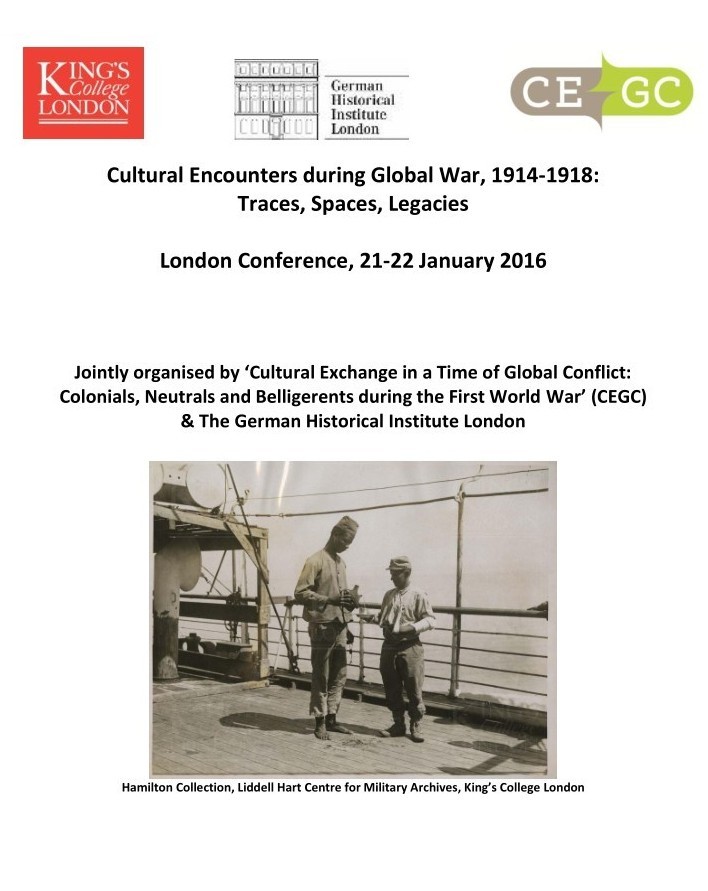Accueil > Actualités ultramarines > Colloque "Cultural Encounters during Global War, 1914-1918 : Traces, (...)
Colloque "Cultural Encounters during Global War, 1914-1918 : Traces, Spaces, Legacies" (Londres, 21-22 janvier 2016)
Le 18 janvier 2016 à 16h53
Cultural Encounters during Global War, 1914-1918
Traces, Spaces, Legacies
Londres, du 21 au 22 janvier 2016
"The First World War resulted in an unprecedented range of encounters between peoples from different ethnic, social and cultural backgrounds. Soldiers from across the globe travelled to different theatres of war – Europe, the Middle East, East Africa, Egypt, Gallipoli – where they not only encountered fellow-soldiers and non-combatants with different languages, religions or customs, but also interacted with friendly or belligerent civilians. Between 1914 and 1918, on French soil alone, there were over 1 million Asian and African men, both soldiers and non-combatants, in addition to soldiers from Australia, New Zealand and North America.
Europe would never be the same again not just in terms of the war’s wreckage but in terms of people, ethnicities and cultures that were encountered, manipulated, studied, befriended. These encounters not only affected the individuals involved, but left deep traces in the literature, arts and culture of the times.
Simultaneously, a different kind of ‘cultural encounter’ was being engineered within Europe : the belligerent states were each trying to win over the neutral nations by funding cultural institutions and trying to influence artists, writers and opinion makers throughout the war. Neutral countries, particularly Sweden and Switzerland, became hubs for the activities of anti-colonial revolutionaries from Asia and North Africa. Furthermore, belligerent countries carried out intensive propaganda in Europe as well as in the colonies to ensure either imperial loyalty or to mobilize anti-colonial feelings and actions.
This interdisciplinary conference seeks to investigate the different kinds of encounters, exchanges and entanglements happening during wartime. What particular pressures did the conditions of war put on such encounters ? What is the relationship between ‘forced encounters’ (as in camps for POW or civilian internees), ‘voluntary’ encounters (as in towns, markets, billets) and the state-sponsored ideologically motivated ‘indirect’ encounters (in the neutral countries) ? Does encounter always involve exchange ? What were the structures of power and how did they navigate the prevalent ideologies of race ? How did the encounters and exchanges occur across linguistic, national, religious, ethnic and social barriers, and what were their post-war legacies in terms of social, cultural, artistic and literary memory for Europe ?
The conference aims to overcome the dominant national and geographical approaches to the First World War and seeks to investigate moments and processes of cultural encounters, exchange, porosity and (mis-) understanding from different disciplinary perspectives, including history, geography, literature, anthropology, cultural, area, visual and gender studies."
Programme du colloque

Pour mémoire, l’appel à communication
Sources de l’information :
http://www.cegcproject.eu/activities-events/cegc-events-conferences-and-workshops/
http://www.cegcproject.eu/events/event/cultural-encounters-during-global-war-1914-1918-traces-space-legacies/


